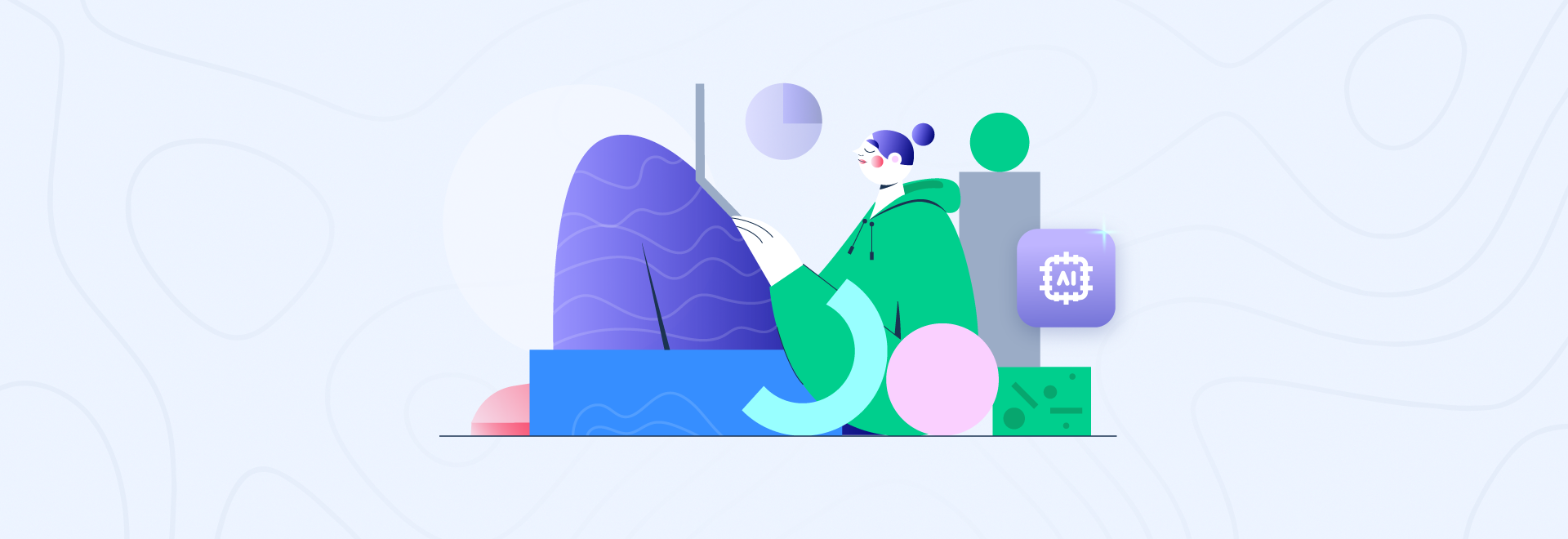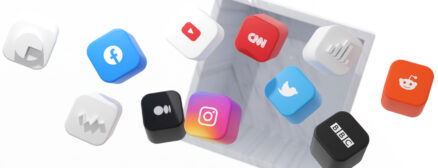Work Smarter, not Harder – AI Solutions for Marketing Teams
We’d heard of AI’s transformative power for years, but for most people it was hard to grasp something so intangible. Then ChatGPT burst onto the scene and everyone said “Ohhhh….wow”. But AI is so much more than the generative text that ChatGPT produces. Think of it as a brain, with rapidly growing processing power – faster than any computing advancement we’ve ever seen. To truly grasp the potential of AI for Marketing professionals, you must dissect everything you do and ask yourself, “could AI improve this?”. When the answer is yes, a quick search often reveals AI-powered software tools built for that specific purpose.
It takes courage to look, and some will be reluctant. Change is like an ocean current. If you swim against it you’ll be battered and exhausted. If you don’t like where it’s heading you can play it safe and swim sideways to safer shores. But if you like where it’s headed, the fastest path is forward. This article is for marketers that are ready to swim toward the new shores of artificial intelligence apps and software for marketing teams.
The integration of AI into marketing practices
In a 2020 survey conducted by Deloitte, 74% of global executives agreed that “AI will be integrated into all enterprise applications within three years.” When you consider the countless ways AI is being applied to business purposes, this prediction seems fairly accurate. But it’s rare to find marketing teams that have truly integrated AI tools in their day-to-day activities. That’s likely to change rapidly as more companies move from investigation to operisation. And if you’re one of the professionals tasked with researching and selecting some AI tools for your Marketing team, we have a great list for you in the sections that follow.
Why is AI relevant to marketers?
To explore the relevancy of AI-enabled digital tools for Marketing departments, it’s best to start with the fundamental question of ‘what do marketers do?’
Customer insights: Gathering customer intelligence, defining segments and target audiences
Go-to-market positioning of products and services: Understanding the company’s products and services and meaningfully connecting them to customer needs
Marketing strategies and tactical plans: Defining the channels, key messages, and content to promote the company
Marketing execution: Creating the campaigns and day-to-day creative tactics to support the strategy, including:
- Organic – website and social media content
- Earned – attracting attention from media and influential associations
- Paid – designing, executing and optimising ad campaigns
- Outbound – email marketing campaigns
Monitoring and engagement: Observing the activity of customers and prospects, and interacting with them
Client retention and upselling: Mining the client base and developing a data-driven understanding of customers.
The larger the Marketing team, the more specialized each role becomes. If you’re part of a large team, you may find you only operate in 3-4 of these areas. If you work in a start-up, you may have a role in all of them. As we explore AI-powered tools for Marketing in the next section, we’ll revisit these categories so you can quickly find the ones most relevant to you.
AI-Powered marketing tools
Customer insights
Customer intelligence software tools use AI to provide predictive insights. Terminus is a powerful platform for B2B marketers to focus on decision-makers in target accounts that matter most. Amperity is great for audience sgementation; it uses AI to spot connections among your audience.
Go-to-market positioning of products and services
AI chatbots can aid your business by providing 24/7 customer support, but they are also a powerful tool for surfacing product promotions and offers. While your company’s chatbot may not be owned by Marketing, your team should be at the table to help shape the chatbot experience. Some popular AI chat solutions include IBM Watson Assistant, Drift, and our very own SentiOne Automate.
Marketing strategies and tactical plans
An essential component of any marketing plan is competitor analysis. Understanding the approach of your competitors allows you to differentiate. AI tools like Crayon can help. It tracks and reports your competitors’ web updates, social media activity, product pricing, news and events, and leadership changes.
Marketing execution
Organic content: The breadth of AI tools designed to help marketers create content has grown by leaps and bounds in recent years. AI writing tools allow marketers to select a template (e.g. blog post, web page, social post, etc.), provide a brief description, and watch as the software creates a full-length content piece. Some popular text generators include Jasper, Frase, and Copy.ai. AI editing tools like Grammarly and Hemingway generate recommendations as you type, dramatically reducing the need for late-stage editing. If your company operates in multiple languages, DeepL is an AI translation tool that can be a huge time saver.
Turning to visual production, platforms like Pronto and Invideo use AI to recommend music and visual content, allowing a non-skilled user to produce professional quality videos in minutes. Canva and VismeChart have AI capabilities to support the production of stunning graphics with minimal effort. AI solutions like Acrolinx can help measure the ROI of your content and surface recommendations for improvement.
On social media, Marketers have a range of tasks to keep the channel fresh including content creation and scheduling. Platforms like Ocoya make the job easier through AI-based automation.
Earned media: In today’s information-rich environment, attracting the interest of journalists and industry influencers is a challenge. Howler helps automate public relations by using AI to match your campaigns with suitable journalists from their database of over 600,000 media companies.
Paid media: There are several AI advertising platforms to help your team optimise ad spending. These include Albert, Shutterstock.ai, and Smartly.io for social media advertising. For creating and optimising ads, try the ad creative AI capabilities of Persado or Pencil.
Outbound (email marketing): Some AI marketing platforms specialising in email campaigns include Seventh Sense, 6Sense, and Unbounce. Zapier adds a layer of AI to provide audience insights to inform your email campaigns.
Monitoring and engagement
If audience engagement is your goal (and it should be), it’s essential to monitor activity around your brand, competitors, and industry topics. Social media monitoring solutions like emplifi.io and SentiOne Listen harvest all of your brand mentions in one place, and provide AI-based pattern detection to alert you when there is significant activity.
Client retention and upselling
One of the best opportunities for sales growth is almost always with your existing clients. AI-based data mining tools like Optimove, Braze, and Adverity can help you find gold in your CRM. Zeotap uses AI-based predictive analytics and machine learning marketing intelligence to guide customers through an optimised experience.
Advantages provided by AI marketing tools
The benefits of AI marketing platforms typically include one or all of these factors:
- Speed / cost: If you’ve watched an AI content creator produce a 1,500-word article in a few seconds, you already know how efficient AI tools can be. There is the potential for a massive reduction in manual, time-consuming work that can result in real cost savings.
- Intelligence: AI can crawl through vast amounts of data and recognize patterns or develop predictions.
- Data-driven decision making: Marketers no longer must rely on intuition or guess-work as they produce strategies and marketing assets. Having data-rich sources of fact can provide quantitative support for your plans.
Concerns and limitations
While today’s AI tools point to a bold future for Marketing teams, the reality is we’re not completely there yet. As perfectly as a chatbot may be trained, there will still be some small percentage of users who are frustrated by it’s ability to understand their intent. Content creation tools lack a capacity to truly understand the words they generate, which can lead to confusing and even downright false information being produced. And the copy they provide often comes across as stiff and lacking emotion.
Can AI replace marketers?
The reality is there are some routine tasks conducted by humans that AI can fulfill. For something like writing social media captions, if you task a content generation tool with writing 10 different versions, chances are there will be a high-quality caption in there. You need an editor, but not a writer.
But fear not marketers! Where there is change, there is opportunity. The AI revolution will usher in a fantastic opportunity to level up your skills. For example,
- Writers who are manually producing text today can evolve into strategists that help define the content strategy and choose the right topics for your business goals.
- By developing a deep understanding of the company’s marketing AI tools, you can evolve to become a product owner with the expertise to unlock the full potential of AI for your organisation.
Marketing teams can move faster and do more by using AI. That doesn’t alleviate the need for humans, it creates a more complex web of relationships and interactions that requires careful and dedicated attention from humans. As written in the introduction above, being engaged and adaptable during periods of rapid change can result in some of the best career growth you’ve experienced.
Automate social media monitoring with SentiOne Listen
One of the benefits of AI in digital marketing is the ability to harvest insights from interactions with your content. To get the most from your content strategy you need to actively monitor, engage, and optimise your efforts. SentiOne Listen is a powerful social listening platform that helps you track audience engagement in real-time. To learn more, visit SentiOne.com or book a demo.



